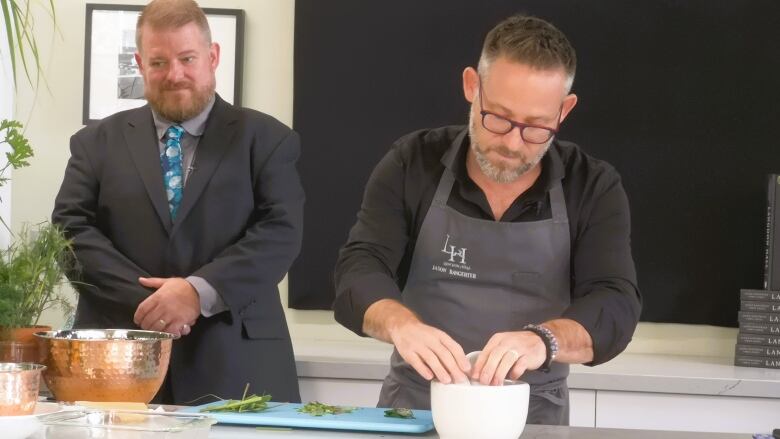Deep Dish Dialogues at U of G covers sustainable food, culinary traditions and more: Andrew Coppolino
Segments are filmed in the newly-renovated Anita Stewart Memorial Food Lab

While gently whisking a bowl of eggs and champagne over medium heat to make luscious and silky "scrambled eggs," Langdon Hall chef Jason Bangerter is just as interested in talking about the local food economy as he is about his unique breakfast dish.
His late-September demonstration was onthe University of Guelph's "Deep Dish Dialogues," a monthly online series hosted by the Ontario university's School of Hospitality, Food and Tourism Management.
The cooking demonstration and discussions feature chefs and food experts addressing a variety of topics in the newly-renovated Anita Stewart Memorial Food Laboratory.
The dialogues blend the practical with the philosophical: Demonstrating the technique allows Bangerter the time to talk about sustainability in our food system and our responsibility to be informed about it.
"I think the biggest message I want to send people in events like this is to know where their food comes from. How was your fish sourced? Where did the vegetables come from?" says Bangerter.
"Be in a position where you're strengthening our environment and our community by supporting those food producers in our community."
The comment is in good part what the dialogues are designed to do, according to Statia Elliot, director of the school.
"Think of those conversations around your own kitchen table," says Elliot. "We are broadcasting stories about issues like sustainability and community that are all connected to food."
Historic place on campus
The building that is home for the lab, named for University of Guelph's food laureate the late Anita Stewart, a food activist and expert in Canadian cuisines, in itself connects significant food histories, Elliot adds.

"This is a really historic place on campus. It started in 1903 where women came to study home economics. Today, we use the space to educate students about all things food. In our renovated culinary studio, we bring in top chefs,academics and community representatives to demonstrate and discuss."
Built during the Edwardian era, the space had a role instructing young rural women in "domestic science" before it became a training facility for chefs in the Royal Canadian Air Force during the Second World War.
Over the past several months, the dialogues have included demonstrations by Joseph Shawana, an Indigenous chef;Chitra Saravanan, an Indian chef;and cooking by Bashir Munyeduring Black History Month.
Another dialogue featured Waterloo ice cream entrepreneur Ajoa Mintah of the hugely successful Four All Ice Cream company.
Subject matter goes beyond cooking techniques
The dialogues have addressed more than cooking techniques: They've taken on topics from plant-based foodand baking with spent grain from the brewing process to circular food systems.
The subject-matter experts come from the university's academic ranks as well as food purveyors and chefs like Bangerter.
As part of the Lang School of Business and Economics, the lab is used for teaching University of Guelph nutrition and hospitality students about food safety, its preparation and, just as important, its cultural contexts as well as becoming a "broadcast studio" for the dialogues which anyone can view on the Lang School of Business YouTube channel.
In its way, Bangerter's discussion of his philosophy and the demonstration, which also included preparing a sustainable fish dish, was a call to "think global and act local."
He sees as part of his responsibility training his crew of young cooks the culinary leaders of tomorrow about growing food in the LangdonHall gardens and understanding the importance of sustainability and nurturing local economies. They are concepts he says we can all embrace.
"Everyone at every level can make change when it comes down to climate change simply by their behaviour and their choices," he says.
It's a common theme that unifies the dialogues: Elliot says that sustainability and using local ingredients must be included in the conversation.
"Everybody, in your own kitchen, can be part of the solution."
Upcoming Deep Dish Dialogues:
- Butchery: to be released Oct.27.
- Cooking economically: to be releasedNov.17.
- Festive wine and spirits: to be released Dec.1.












_(720p).jpg)


 OFFICIAL HD MUSIC VIDEO.jpg)
.jpg)



























































































